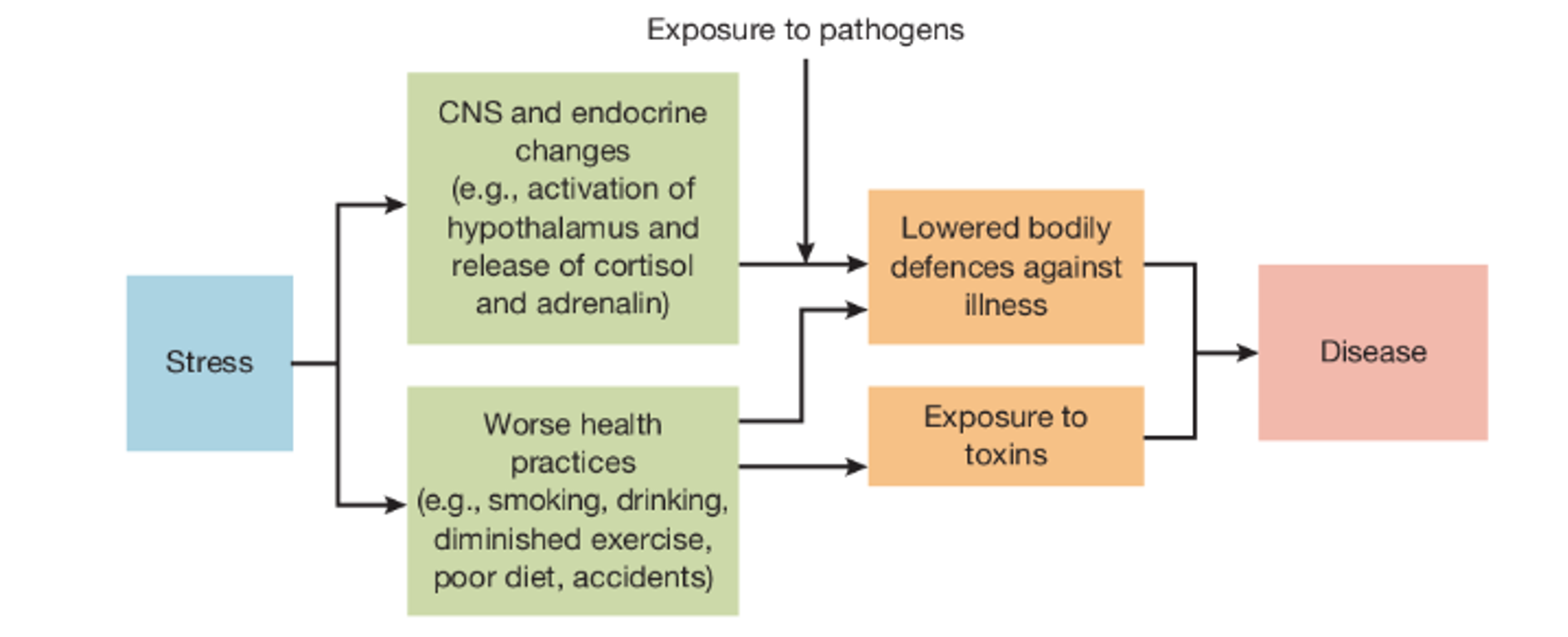Health, Stress, and Coping Recording 2
Understanding Stress
Definition of Stress: Stress is a challenge to a person's capacity to adapt to inner and outer demands. It typically produces physiological and emotional arousal and elicits cognitive and behavioral efforts to cope. Additionally, stress can manifest in various ways depending on individual resilience, past experiences, and current life situations.
Major Causes of Stress: Causes may vary among individuals and can include multitasking, work pressure, personal responsibilities, financial issues, and relationship difficulties. External factors such as environmental changes or global events (e.g., pandemics) can also amplify stress levels.
Cumulative Nature of Stress: Even small daily stresses—like traffic jams or missed deadlines—can accumulate and become significant if experienced simultaneously or consecutively, leading to a phenomenon known as 'stress overflow.'
Physiological Effects of Stress
Selye’s General Adaptation Syndrome
§Alarm
§Release of adrenaline and other hormones (fight or flight response)
§Resistance
§Respiration and heart rate return to normal, glucose levels and some stress-related hormones remain high
§Exhaustion
§After prolonged stress the body’s defences break down, increased vulnerability to infection/disease
Fight or Flight Response: Discovered by Walter Cannon, this is a physiological reaction to threats where the autonomic nervous system prepares the body to either confront or flee from perceived danger. This response is critical for survival but can be detrimental when triggered by chronic, non-life-threatening stressors.
Adaptation noted for acute threats; however, chronic everyday stressors challenge this response and can lead to long-term health issues.
SELYE- General Adaptation Syndrome (GAS): Proposed by Hans Selye, it describes three stages of stress response:
Stage 1: Alarm Stage: Recognition of threat and mobilization of resources (fight or flight response).
Stage 2: Resistance Stage: Prolonged stress where physiological arousal stabilizes above baseline as the organism copes, potentially leading to irritability and fatigue.
Stage 3: Exhaustion Stage: Depletion of bodily resources, which may lead to stress-related diseases such as hypertension and anxiety disorders.
Coping with Stress
¡Transaction between the individual and environment
§Primary appraisal
§Secondary appraisal
▪Emotional forecasting
Primary Appraisal: Initial evaluation of whether a stressor is threatening and its relevance to well-being (positive, negative, neutral).
Secondary Appraisal: Assessment of what can be done about the stressor; evaluating coping resources and abilities can lead to proactive problem-solving or avoidance tactics.
Types of Stress (As proposed by Lazarus):
¡Lazarus proposed three types of stress
§Harm or loss
§Threat
§Challenge
Harm or Loss: Perceived damage already done, leading to feelings of grief or regret.
Threat: Anticipated harm in the future evokes anxiety and worry.
Challenge: Framing the situation as an opportunity for growth, fostering motivation and resilience.
Coping Strategies: Two main categories:Problem - Focused Coping: Actively seeking solutions or changing the stressful situation; involves planning and resource management.
Emotion - Focused Coping: Managing emotional responses to the stressor; can include techniques like meditation, exercise, and seeking social support.
Sources of Stress
Life Events: Significant changes requiring adaptation, e.g., moving, divorce, job changes, and can create substantial psychological and emotional stress.
Catastrophes:
Daily Hassles: Minor stresses that accumulate and can have similar effects as major stressors; examples include long queues, noise pollution, or unexpected expenses.
Holmes Rahe Scale: Measures common life events and assigns stress values, demonstrating that both positive and negative experiences can be stressful and affect overall well-being.
Impact of Stress on Health

Health Conditions Linked to Stress: Chronic stress weakens the immune response, leading to illnesses such as colds, cardiovascular disease, and gastrointestinal issues.
Role of Personality: Personality traits (Type A vs. Type B behaviors) can influence stress levels and health risks. Type A individuals tend to have higher health risks due to their competitive and aggressive behavior patterns.
Social Support: Acts as a buffer against stress, promoting resilience by providing emotional and practical resources. High levels of social support are associated with better health outcomes.
Psychoneuroimmunology: Studies how psychological factors affect immune system functioning, highlighting the connection between stress, mental health, and overall physical health.
STRESS, Health and PERSONALITY
¡Personality can influence stress and health through motives, cognitive appraisal of situations, and coping strategies employed- Type A Behaviour Pattern
Characterised by impatience, ambition, competitiveness, hostility, and a ‘hard driving’ approach to life
§Optimism/Pessimism
COPING
¡Coping is the way in which people deal with stressful situations
¡Coping mechanisms
¡Problem-focused Person attempts to change the situation
¡Emotion-focused Person attempts to change thoughts or emotional consequences of the stressor
¡Low-effort syndrome – tendency to exert minimal effort to escape stressful circumstances
SOCIAL SUPPORT
¡The presence of others in whom one can confide and from whom one can expect help and concern
¡A high level of social support is protective against the effects of stress by
¡Buffering people against the effects of stress
¡Making people less susceptible to the effect of stress in the first place
¡Loneliness is a major source of stress in humans with a physiological as well as psychological impact
Cultural Influences on Stress and Coping
Cultural backgrounds affect perceptions and responses to stress. Historical hardships can shape coping mechanisms, such as low effort syndrome in marginalized communities, where individuals may feel powerless to effect change.
Future Directions in Health Psychology
¡Environment (Westernisation)
¡Treatment support
¡Reduce health disparities
¡Technology
Increasing focus on promoting positive health behaviors and coping strategies against health-compromising behaviors is vital. Addressing health disparities and leveraging technology for psychological support can lead to innovative solutions. Continued emphasis on understanding the influences of lifestyle changes due to westernization on health outcomes is necessary to promote well-being in diverse populations.